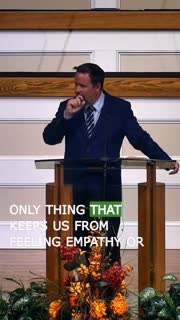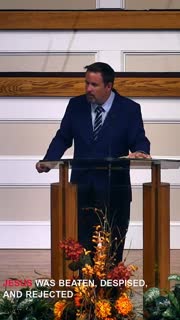Jesus' Journey to the Cross: Love and Sacrifice
Summary
### Summary
In John chapter 19, we witness the profound and harrowing journey of Jesus Christ as He heads towards the cross. Jesus, having been arrested and subjected to a sham trial by the Jewish religious leaders, is brought before Pilate. Despite Pilate's attempts to release Him, the crowd chooses to free Barabbas, a murderer, instead. Pilate, troubled by the claims that Jesus declared Himself the Son of God, questions Jesus, but receives no answer. Jesus' silence and His calm assertion that Pilate has no power over Him except what is given from above, underscores His divine authority and mission.
Jesus' path to the cross is marked by severe physical and emotional suffering. He is scourged, a brutal punishment that leaves Him bloodied and weakened. The soldiers mock Him, placing a crown of thorns on His head and a purple robe on His shoulders, sarcastically hailing Him as the King of the Jews. Despite Pilate's declaration of Jesus' innocence, the crowd, driven by hatred and blind anger, demands His crucifixion.
This journey to the cross is not a surprise to God; it is part of His divine plan. Jesus is the Passover Lamb, the ultimate sacrifice for mankind's sin. The Jewish leaders' rejection of Jesus, even preferring the hated Roman Caesar as their king, highlights the depth of their spiritual blindness and hatred. Yet, Jesus' mission is clear: to bear the sins of humanity, to be despised and rejected, and to offer salvation through His sacrifice.
Isaiah 53 prophetically speaks of Jesus' suffering, emphasizing that He was wounded for our transgressions and bruised for our iniquities. His suffering brings us peace and healing. Jesus' journey to the cross is a profound demonstration of God's love for us, a love that endures despite our sin and rejection.
### Key Takeaways
1. Divine Authority and Mission: Jesus' calm response to Pilate's assertion of power reveals His divine authority. He reminds Pilate that any power he has is granted from above, emphasizing that Jesus' journey to the cross is part of a divine mission, not a result of human authority. This teaches us that God's plans are sovereign and beyond human control. [07:38]
2. The Brutality of Scourging: The description of Jesus' scourging is a stark reminder of the physical suffering He endured. The Roman scourge, designed to inflict maximum pain, left Jesus' body bloodied and weakened. This vivid portrayal helps us understand the extent of Jesus' sacrifice and the physical cost of our redemption. [12:08]
3. Hatred and Blindness: The Jewish leaders' hatred for Jesus blinded them to His innocence and divine nature. Their demand for His crucifixion, despite Pilate's declaration of His innocence, shows how sin can distort our perception and lead us to reject God's truth. This serves as a warning against allowing hatred and sin to cloud our judgment. [19:30]
4. Prophetic Fulfillment: Jesus' suffering and rejection fulfill the prophecies of Isaiah 53. He was despised, rejected, and wounded for our transgressions. This fulfillment of prophecy underscores the divine plan and purpose behind Jesus' suffering, reminding us that God's promises are always fulfilled. [28:41]
5. God's Enduring Love: Despite being beaten, despised, and rejected, Jesus' journey to the cross is a profound demonstration of God's love for humanity. He willingly endured suffering and death to offer us salvation. This sacrificial love calls us to reflect on our own lives and the depth of God's love for us, encouraging us to live in gratitude and obedience. [30:09]
### YouTube Chapters
[0:00] - Welcome
[04:49] - Jesus and Barabbas
[05:28] - Pilate's Dilemma
[06:04] - Pilate Questions Jesus
[07:38] - Jesus' Divine Authority
[09:25] - God's Plan Unfolds
[10:51] - The Scourging of Jesus
[12:08] - The Brutality of Scourging
[13:38] - Jesus' Physical Suffering
[15:01] - Mocked and Humiliated
[16:34] - Pilate Presents Jesus
[17:58] - The Crowd's Hatred
[19:30] - Hatred and Blindness
[20:35] - Jesus' Miracles and Rejection
[22:13] - Pilate's Final Judgment
[23:48] - The Judgment Seat
[25:22] - The Crowd Rejects Jesus
[27:08] - Jesus' Final Rejection
[28:41] - Prophetic Fulfillment
[30:09] - God's Enduring Love
Study Guide
### Bible Study Discussion Guide
#### Bible Reading
1. John 19:1-16 - The account of Jesus' trial before Pilate, His scourging, and the crowd's demand for His crucifixion.
2. Isaiah 53:3-7 - The prophecy of the suffering servant, describing Jesus' suffering and sacrifice.
#### Observation Questions
1. What was Pilate's initial reaction to the Jewish leaders' demand for Jesus' crucifixion? How did he try to release Jesus? ([04:49])
2. Describe the physical and emotional suffering Jesus endured as detailed in John 19:1-3. What specific actions did the soldiers take to mock and humiliate Him? ([10:51])
3. How did Jesus respond to Pilate's assertion of power over Him? What does this reveal about Jesus' understanding of His mission? ([07:38])
4. What was the crowd's reaction when Pilate presented Jesus to them after His scourging? How did their hatred manifest? ([19:30])
#### Interpretation Questions
1. What does Jesus' calm response to Pilate's assertion of power teach us about His understanding of divine authority and mission? How does this perspective challenge our view of human authority? ([07:38])
2. The brutality of Jesus' scourging is vividly described in the sermon. How does understanding the physical cost of our redemption impact your view of Jesus' sacrifice? ([12:08])
3. The Jewish leaders' hatred for Jesus blinded them to His innocence and divine nature. How can sin and hatred distort our perception and lead us to reject God's truth? ([19:30])
4. Isaiah 53 prophetically speaks of Jesus' suffering. How does the fulfillment of this prophecy in Jesus' life and death reinforce the reliability of God's promises? ([28:41])
#### Application Questions
1. Reflect on a time when you felt powerless in a situation. How can Jesus' response to Pilate's assertion of power encourage you to trust in God's sovereignty in your own life? ([07:38])
2. The sermon describes the severe physical suffering Jesus endured. How does this understanding of His sacrifice influence your gratitude and worship? ([12:08])
3. Have you ever allowed hatred or anger to cloud your judgment and lead you to make decisions you later regretted? How can you guard against this in the future? ([19:30])
4. Jesus' journey to the cross was part of God's divine plan. How can you find comfort in knowing that God's plans are sovereign and beyond human control, especially in difficult times? ([09:25])
5. The Jewish leaders' rejection of Jesus highlights the danger of spiritual blindness. Are there areas in your life where you might be rejecting God's truth due to sin or pride? How can you seek clarity and repentance? ([19:30])
6. Isaiah 53 speaks of Jesus bearing our griefs and carrying our sorrows. How can you apply this truth to your own struggles and find peace in His sacrifice? ([28:41])
7. Jesus' sacrificial love calls us to live in gratitude and obedience. What specific actions can you take this week to demonstrate your gratitude for His sacrifice and live out His love in your daily interactions? ([30:09])
Devotional
### Day 1: Divine Authority and Mission
Jesus' calm response to Pilate's assertion of power reveals His divine authority. He reminds Pilate that any power he has is granted from above, emphasizing that Jesus' journey to the cross is part of a divine mission, not a result of human authority. This teaches us that God's plans are sovereign and beyond human control. [07:38]
John 19:10-11 (ESV): "So Pilate said to him, 'You will not speak to me? Do you not know that I have authority to release you and authority to crucify you?' Jesus answered him, 'You would have no authority over me at all unless it had been given you from above. Therefore he who delivered me over to you has the greater sin.'"
Reflection: Think about a situation in your life where you feel powerless. How can you trust in God's sovereign plan and authority over that situation today?
### Day 2: The Brutality of Scourging
The description of Jesus' scourging is a stark reminder of the physical suffering He endured. The Roman scourge, designed to inflict maximum pain, left Jesus' body bloodied and weakened. This vivid portrayal helps us understand the extent of Jesus' sacrifice and the physical cost of our redemption. [12:08]
Isaiah 52:14 (ESV): "As many were astonished at you—his appearance was so marred, beyond human semblance, and his form beyond that of the children of mankind—"
Reflection: Reflect on the physical pain and suffering Jesus endured for your sake. How does this deepen your appreciation for His sacrifice and influence your daily walk with Him?
### Day 3: Hatred and Blindness
The Jewish leaders' hatred for Jesus blinded them to His innocence and divine nature. Their demand for His crucifixion, despite Pilate's declaration of His innocence, shows how sin can distort our perception and lead us to reject God's truth. This serves as a warning against allowing hatred and sin to cloud our judgment. [19:30]
Acts 3:14-15 (ESV): "But you denied the Holy and Righteous One, and asked for a murderer to be granted to you, and you killed the Author of life, whom God raised from the dead. To this we are witnesses."
Reflection: Is there any area in your life where hatred or sin is distorting your perception? How can you seek God's truth and clarity in that area today?
### Day 4: Prophetic Fulfillment
Jesus' suffering and rejection fulfill the prophecies of Isaiah 53. He was despised, rejected, and wounded for our transgressions. This fulfillment of prophecy underscores the divine plan and purpose behind Jesus' suffering, reminding us that God's promises are always fulfilled. [28:41]
Isaiah 53:3-5 (ESV): "He was despised and rejected by men; a man of sorrows, and acquainted with grief; and as one from whom men hide their faces he was despised, and we esteemed him not. Surely he has borne our griefs and carried our sorrows; yet we esteemed him stricken, smitten by God, and afflicted. But he was pierced for our transgressions; he was crushed for our iniquities; upon him was the chastisement that brought us peace, and with his wounds we are healed."
Reflection: How does knowing that Jesus' suffering was part of God's divine plan and prophecy impact your faith in God's promises? What specific promise of God do you need to trust in today?
### Day 5: God's Enduring Love
Despite being beaten, despised, and rejected, Jesus' journey to the cross is a profound demonstration of God's love for humanity. He willingly endured suffering and death to offer us salvation. This sacrificial love calls us to reflect on our own lives and the depth of God's love for us, encouraging us to live in gratitude and obedience. [30:09]
Romans 5:8 (ESV): "But God shows his love for us in that while we were still sinners, Christ died for us."
Reflection: Reflect on the depth of God's love for you as demonstrated through Jesus' sacrifice. How can you live out this love in your interactions with others today?
Quotes
1. "Jesus was on His way to the cross. He was on His way to being the sacrificial lamb for the Passover. There was nothing that Pilate was going to be able to do to stop Him. He was going to be able to stop this no matter how hard He may try. At one point, as Pilate was seeking to release Jesus, the religious Jewish leaders cried out in John chapter number 19 and verse number 7, the Jews answered Him, We have a law, and by our law He ought to die, because He made Himself the Son of God." [04:49] (35 seconds)
2. "Basically what Jesus Christ responds to him is, don't you know who I am? Don't you know the power that I have? Don't you know that you have no power at all except it were given to you by me? I am the all-powerful one. I am the creator of all things. Jesus wasn't trapped. Jesus was, his life wasn't hanging in the balance by the word of Pilate. Jesus Christ was on a mission. Jesus was, Jesus was on his way. To being the Passover lamb." [07:38] (34 seconds)
3. "This was not a surprise to God. This didn't catch God off guard. This didn't catch God off guard. This didn't catch God off guard. This didn't catch God off schedule here. This was all part of the plan of God. He knew what man would do. And he knew that man needed someone to pay the price for their sin. He knew he would be despised and rejected of men. He knew that he would be wounded for our transgressions and bruised for our iniquities. He knew that he would be oppressed for the afflicted. Yet he would not open his mouth. He was a lamb brought. To the slaughter, as was prophesied hundreds of years before by the prophet Isaiah. He knew this was coming. He knew he was headed to the cross to be the sacrifice for our sin. He knew that he would be beaten, despised, and rejected. This was not a surprise to him." [09:25] (53 seconds)
4. "Jesus' beating was so severe that he was unable to carry his cross when it was time for his crucifixion. By the time he was on his way to Golgotha, he would have been suffering from blood loss and shock. His breathing was probably labored. His blood pressure would have dropped and his body would most likely at this point be shaking and be trembling. His skin would be dangled like ribbons from his body. John states that Jesus was scourged. This is what he means. That's the suffering he went through." [13:38] (38 seconds)
5. "The only thing that keeps us from feeling empathy or sympathy for others is when we have a hatred in our heart toward that person. That is why a group like Hamas can murder 1,200 people and many Arabs and Muslims. Celebrate on that day. That is why a nation like Israel can destroy much of Palestine and kill people. And the Israelis don't feel bad for them. When there's hatred in someone's heart towards someone else, it blocks the emotions of sympathy and empathy." [19:30] (34 seconds)
6. "Jesus Christ was despised by the religious Jewish leaders so much so that they had no compassion for him even as he stood there beaten and mocked and bloodied. We also see through this passage that Jesus Christ was rejected it says in verse number 12 of chapter 19 and from 4th pilate sought to release him but the jews cried out saying if thou let this man go thou are not caesar's friend whosoever maketh himself a king speaks against caesar." [22:13] (34 seconds)
7. "Jesus was rejected as the messiah he wasn't who they wanted him to be and so they rejected him you know despite all that god has done for us there's still people today who reject him he doesn't fit into the box that they want their god to be he doesn't approve of their sin or of their lifestyle he doesn't do what they they want him to do and so they don't want him they want a god and a king that does things the way that they want it to be done and when jesus is revealed as different than what they want they reject him even to this day." [27:08] (40 seconds)
8. "Jesus was beaten, despised, and rejected for us. Because we deserve to be beaten, despised, and rejected for our sin. But Jesus took that all upon himself. And he took it all the way to the cross to be the Passover lamb, to die. To die in our place. Oh, what love. Oh, what love God has for us. Have you experienced this love? Have you experienced the forgiveness of your sin? That only God can offer you through Jesus Christ. Do you meditate on what your sin calls Jesus Christ? Every time you get angry, every time you envy, every time you covet, every time you lie, that's what Jesus was beaten for. That's what Jesus was crucified for. Sin is not a light matter. But Jesus loved us to die in our place. Oh, what love that he has for us." [29:29] (73 seconds)








